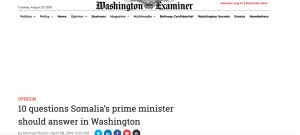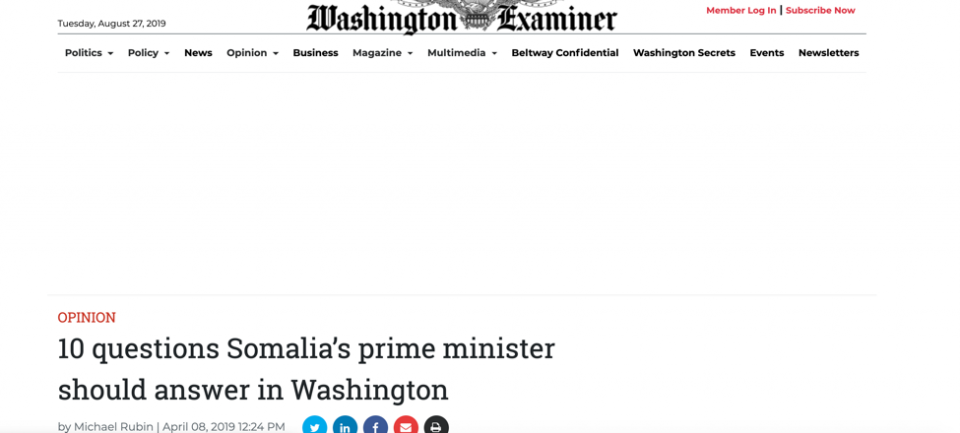
It has again emerged that mediocre stories are clouding Somalia. Stories run by some international papers put into question the calibre of some writers. To the key policy makers and economists non-factual media reports cannot help as far as state development is concerned. Sad, is when a group of citizens who have been lucky to get an education in some of the most prestigious institutions go ahead and write stories seen as not providing solution to government agendas. Citizens come in to help unite the nation by telling stories are they are. When a certain lot visit a foreign country, they tend to forget their native language. The moment Somali language, for example, is getting lost, no good narratives can be pushed. The need for more understanding of ones’ native country – don’t cross what is termed “the redline.” It is not time to lose patriotism.
Factual stories will in the long run ensure sustained development. Professionals who are outside the country should keep tab with current situations in order to avoid condemnations which are uncalled for. There are various economic goings on in Somalia, for instance, that one can focus on. But why are foreign writers telling odd stories about Somalia?
In a July 26, Washington Examiner opinion piece that touched on 10 questions Somalia’s prime minister should answer in Washington, one Michael Rubin pointed out the current developments in Somalia under President Mohamed Abdullahi Mohamed famously known as Farmajo. Instead of development initiatives, the writer tilted his focus more on security issues. Such stories are misleading outsiders. Lack of better communication of things that will ensure jobs are created while more hospitals and schools built are would simply do more harm than good.
“The tremendous corruption Somalia faces and which Farmajo has not countered has undercut Somalia’s security,” Rubin wrote in the editorial. Going ahead to say that Farmajo alleged that Al Shabaab has been infiltrated by foreigners who refuse to harm their own countries but Somalia while noting that the incumbent was challenging the al Qaeda based militia to emulate the foreigners in their fold to attack other nations, the piece wasn’t good news.
The writer fails to give substantive evidence on the allegations. That an elected head of state would seek terror to be reigned on other nations is mere propaganda. Never mind, Mr Rubin cites Kenya as one of the nations that Farmajo wants targeted.
To put to perspective, the biasness of the criticism, why would a critic who claims to love the people of Somalia tell the United States to stop aid to Somalia because its leader has leased fishing rights to China? Is it not an open discourse that every nation engages many other nations for business deals that are beneficial to all? Does he mean to say that the United States and China do not engage in trade deals? And why is it wrong for other governments like Somalia to seek such help? Is that not double standards?
While cognizant to the fact that no government is perfect and demanding for better service delivery is a patriotic duty. We must remain awake to the reality that foreign countries have infiltrated their agenda into many nations through its citizens who sell out. Eventually, they use this as a means to invade nations and exploit its resources for their own good and leaving the host nation in poverty if not ruins.
Somalia has now been without a strong central government for three decades now, while the Somalis should be at the forefront of ensuring their nation rebuilding, it is an open secret that existential threat from other nations and other foreign agents, over the past few years Somalia which is trying to re-establish itself has been a victim of a very ugly geopolitics that is fighting to have influence on the nation. Their tactics have been of various ways, they are known to have pushed their agenda using money, terrorism, and blackmail.
The millions confiscated in the Somali airport meant to divide the Somali parliament in 2017 is just one of the failure efforts by a gulf nations to disrupt the Somali gains, $9.6 million was confiscated after arriving in a private plane.
UAE for example, has taken advantages of the situation in Somalia, over the past year they have secured for themselves strategic ports including entering an illegal deal with the Somaliland administration and giving a stake of the Somali sea to the Ethiopian government.
A case in point is an audio recording which show that the Qatari government had an “interest’’ in Bosaso bombing. It was a telling sign but the government of Qatar refuted the Times’ story noting that it was not given the same recording even after making a formal request.
“The state of Qatar’s foreign policy has always been one of creating stability and prosperity – we do not meddle in the internal affairs of sovereign countries. Anybody doing so is not acting on behalf of our government,” it said in a statement.
This set up which was pushed by the UAE government must have backfired, the Somali government said: “The Qatari government released a statement that they shared with us in which they denied the claim. And we are satisfied with it.”
“The federal government is willing to resolve issues with regional states amicably and with accordance with the National Constitution.” Noted Somalia’s deputy minister for Information. This was a response last year after 5 federal states presidents came together to put pressure on president Farmajo to deliver on his promises.
While it is a valid concern to put a government to task especially on its promises. It is risky, as observed by experts on Somalia politics, that such a council will portray the nation’s institutions like the Election Committee as weak especially in their states. This ultimately denies the commission credibility in the run up to elections. At worst case scenario, these council leaders may even prevent elections from taking place.
Also of importance is the fact that these federal states’ members want to maintain their relations with the United Arab Emirates contrary to the country’s foreign policy. When Somalia refused to cut ties with Qatar as recommended by the UAE, their relationship soured. Leading to suspension of military training programmes in Somalia by the UAE. How do such leaders who want to mortgage the nation’s interest and stability be relied upon or viewed as objective in their criticism?
A while back, Mr Farmajo spoke about the critics of his administration and the achievements of the Federal Government noting that a majority had even opposed the previous Federal Government and were at the heart of its ouster. He alleged that amongst the loudest of his critics, none wants a better Somalia for all. Actually, there is an interest in power and not service delivery.
The problems run much deeper than that. A group of social media too has taken up the criticism of the Somalia government. There is a lot known to set a false agenda and narrative and run with it online. The main aim is generally to paint Somalia black, a broken nation, one devoid of any progress. The Somalia government will now have to work with the loyal citizens who can dilute the Western interest. Quite interesting is the fact that the critics aren’t ready to come forward and offer solutions.

